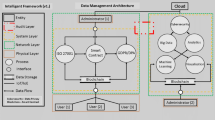Abstract
During the period 2002–2010 the UK government of the time attempted to relate the rights and entitlements of citizenship with a standard identifier for all British citizens and its representation in a national identity smartcard. The scheme to introduce this identity token for all UK citizens was finally abandoned in December 2010. This teaching case describes the history of this endeavour as promoted by the UK government and its agencies. It also describes the reaction to these plans on the part of numerous other stakeholder groups within the UK. This is a rich case for examining a number of critical, contemporary issues of relevance to Information Systems theory and practice that are occurring worldwide. On the one hand, the attempt to introduce such an identity token brought into focus the critical role that identity and its management plays as supporting infrastructure in areas such as e-Government and e-Business. On the other, the introduction of a national identifier and associated token raised major challenges to data protection, data privacy and public trust in the information governance of this nation state. Indeed, such difficulties constituted a major part of the rationale for the abandonment of the project.




Similar content being viewed by others
References
Anderson, R., Brown, I., Dowty, T., Inglesant, P., Heath, W. and Sasse, A. (2009). Database State, London: Joseph Rowntree Reform Trust.
BBC News Online (2001, 14 September 2001). Blunkett considers ID cards [www document] www.bbc.co.uk/news (accessed 25th September 2010).
BBC News Online (2003a, 12 November 2003). Blunkett outlines ID card plans, [www document] www.bbc.co.uk/news (accessed 22nd September 2010).
BBC News Online (2003b, 27 November 2003). Campaign to fight ID cards [www document] www.bbc.co.uk/news (accessed 22nd October 2010).
BBC News Online (2003c, 13th February 2003). ID card scheme panned by watchdog [www document] www.bbc.co.uk/news (accessed 22nd October 2010).
BBC News Online (2003d, 30 September 2003). ID cards get Blair support [www document] www.bbc.co.uk/news (accessed 22nd October 2010).
BBC News Online (2003e, 7th July 2003). Plans for ‘£40 ID cards’ [www document] www.bbc.co.uk/news (accessed 22nd October 2010).
BBC News Online (2004a, 13 August 2004). CBI backs ‘flawed’ ID card scheme [www document] www.bbc.co.uk/news (accessed 22nd October 2010).
BBC News Online (2004b, 24th April 2004). ID cards ‘cannot stop terrorism’ [www document] www.bbc.co.uk/news (accessed 22nd October 2010).
BBC News Online (2004c, 3rd February 2004). ID cards ‘could worsen racism’ [www document] www.bbc.co.uk/news (accessed 22nd October 2010).
BBC News Online (2004d, 20 May 2004). Opponents take on ID cards [www document] www.bbc.co.uk/news (accessed 22nd September 2010).
BBC News Online (2006a, 19th December 2006). Giant ID computer plan scrapped [www document] www.bbc.co.uk/news (accessed 22nd October 2010).
BBC News Online (2006b, 25 September 2005). Identity card cost ‘may be cut’ [www document] www.bbc.co.uk/news (accessed 22nd October 2010).
BBC News Online (2007a, 19 June 2007). ID cards ‘to be UK institution’ [www document] www.bbc.co.uk/news (accessed 22nd October 2010).
BBC News Online (2007b, 20 September 2007). Surveillance ‘is a threat to UK’ [www document] www.bbc.co.uk/news (accessed 22nd October 2010).
BBC News Online (2008a, 11 February 2008). The campaign group: No2ID [www document] www.bbc.co.uk/news (accessed 22nd October 2010).
BBC News Online (2008b, 6 March 2008). ID cards ‘must be free of charge’ [www document] www.bbc.co.uk/news (accessed 22nd October 2010).
BBC News Online (2008c, 6 March 2008). In full: Smith ID card speech [www document] www.bbc.co.uk/news (accessed 22nd September 2010).
BBC News Online (2008d, 12 May 2008). Update: Government admits ID cards have no business case [www document] www.bbc.co.uk/news (accessed 22nd October 2010).
BBC News Online (2009, 30 November 2009). ID card available in Greater Manchester [www document] www.bbc.co.uk/news (accessed 22nd October 2010).
BBC News Online (2010, 25 May 2010). Identity cards scheme will be axed ‘within 100 days’ [www document] www.bbc.co.uk/news (accessed 22nd October 2010).
Beynon-Davies, P. (2006). Personal Identity Management in the Information Polity: The case of the UK national identity card, Information Polity 11 (1): 3–20.
Beynon-Davies, P. (2007). Personal Identity Management and Electronic Government: The case of the national identity card in the UK, Journal of Enterprise Information Management 20 (3): 244–270.
CabinetOffice (2002a). Identity Fraud: A study, London: HMSO.
CabinetOffice (2002b). Privacy and Data Sharing: The way forward for public services, London: Performance and Innovation Unit.
CabinetOffice (2005). Transformational Government: Enabled by technology, HM government, London: CabinetOffice.
Clarke, R. (1987). Just Another Piece of Plastic in Your Wallet: The ‘Australian Card’ scheme, Computers and Society 18 (1): 7–21.
Clarke, R. (1988). Information Technology and Dataveillance, Communications of ACM 31 (5): 498–512.
Crosby, J. (2008). Challenges and Opportunities of Identity Assurance, London: HM Treasury.
Graham-Rowe, D. (2005). Privacy and Prejudice: Whose ID is it anyway? New Scientist 2517: 12–15.
Guardian (2002, 3 July 2002). Explained: ID cards [www document] www.politics.guardian.co.uk (accessed 8th August 2002).
Home Affairs Committee (2004). Identity Cards: Fourth report of session 2003–2004, UK parliament, London: Home Affairs Committee.
Home-Office (2002). Entitlement Cards and Identity Fraud: A consultation paper, London: HMSO.
HomeOffice (2006a). Borders, Immigration and Identity Action Plan: Using the national identity scheme to strengthen our borders and enforce compliance within the UK, London: Home Office.
HomeOffice (2006b). Strategic Action Plan for the National Identity Scheme: Safeguarding your identity, London: Home Office.
Huber, N. (2004). ID Card Costs Soar as Supplier Slams Technology, Computer Weekly 204674: 2.
InformationCommissioner (2006). Report on the Surveillance Society, London: Office of the Information Commissioner.
Liberty (2003). ID Cards: Arguments against, London: Liberty.
LSE (2005). The Identity Project: An assessment of the UK identity cards bill and its implications, London: London School of Economics and Political Science.
Varney, D. (2006). Service Transformation: A better service for citizens and businesses, a better deal for the taxpayer, London: Home Office.
Acknowledgements
An early version of this teaching case was presented at the International Conference of Information Systems, Phoenix, Arizona, 2010. A detailed set of teaching notes for the case is available from the author. I would like to express my thanks to Frank Land and a large number of anonymous reviewers for their constructive comments, corrections and suggestions which much improved this paper.
Author information
Authors and Affiliations
Corresponding author
Rights and permissions
About this article
Cite this article
Beynon-Davies, P. The UK national identity card. J Info Technol Teach Cases 1, 12–21 (2011). https://doi.org/10.1057/jittc.2011.3
Published:
Issue Date:
DOI: https://doi.org/10.1057/jittc.2011.3




